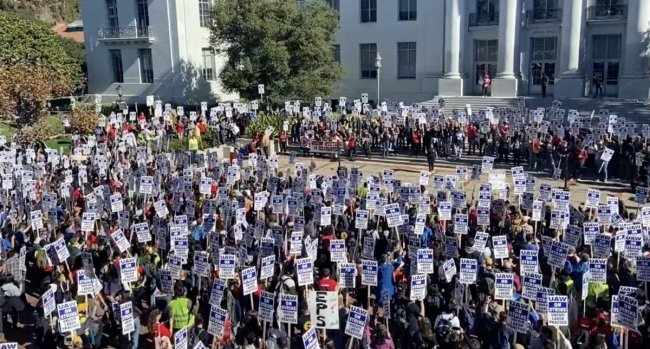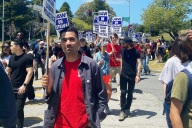You have /5 articles left.
Sign up for a free account or log in.

Some 4,000 student workers strike at UC Berkeley Monday on the first day of a systemwide labor action.
@uaw2865/Twitter
Four bargaining units representing 48,000 graduate teaching and research assistants, readers, tutors, postdoctoral scholars, and academic researchers across all 10 University of California campuses and the Lawrence Berkeley National Laboratory went on indefinite strike Monday—accusing the university of unfair labor practice violations and of generally negotiating new contracts with them in bad faith.
Campus administrations have urged instructional continuity during the strike, but it’s unclear to what extent that will be possible, given the scale of the labor action and the apparent support for it. Some 98 percent of participating union members approved the strike in an authorization vote, suggesting that participation will be high. Thousands of members attended protests and picket lines on their campuses Monday. Numerous tenure-track and tenured professors have publicly expressed solidarity with striking workers, with some canceling classes this week. And while the UC system’s nontenured lecturers are contractually prohibited from participating in sympathy strikes, they’ve stated that they will not assume striking workers’ duties. (The International Brotherhood of Teamsters even reportedly told 53,000 unionized UPS drivers in California that they may skip deliveries to UC campuses during the strike.)
How long the strike will last is another open question. Beyond the various unfair labor practice claims, which are relatively common in contract negotiations, workers across all four United Auto Workers–affiliated units are demanding major pay increases, among other changes.
The unions’ core demands include a $54,000 annual salary minimum for all graduate workers, a $70,000 annual salary minimum for postdocs, a 14 percent salary increase for academic researchers and annual cost-of-living adjustments. At present, minimum graduate worker pay is less than $24,000 and minimum postdoc pay is about $56,000. UAW members say that these adjustments address a worsening housing affordability crisis: according to union survey data, 92 percent of graduate student workers and 61 percent of postdocs are “rent burdened,” meaning that they spend more than 30 percent of their gross income, the federal affordability threshold, on housing.
The average graduate student worker within the UC system spends more than 52 percent of their income on rent, making them “extremely rent burdened,” per federal Department of Housing and Urban Development guidelines, according to the UAW.
Kenzo Esquivel, a research fellow in environmental science at UC’s Berkeley campus, said Monday that his annual pretax salary is $34,000, but only because his department fundraises to supplement his lower base pay.
“This is part of why we’re fighting so hard on this piece of our stipends—there is a discrepancy, depending on the finances of each individual department,” he said. “We want to make sure that those in departments that may not be as well funded are just as comfortable living where they go to school. There’s variability, and what we’re really trying to achieve here is some equity across all UC campuses.”
About Equity
The UAW also frames compensation as a diversity and equity issue, saying in a statement that “UC’s failure to support a diverse workforce undermines the quality of research and education. Compensation that doesn’t match the cost of living and inequitable working conditions are pushing scholars out of academia. We do the majority of teaching and research at UC, yet UC is refusing to offer us a fair share of the record-setting grant and state funding that our labor brings in.”
Esquivel lives off campus, where rent is among the highest in the country, but he said even some of his colleagues who live in university housing devote 50 percent of their pay to rent.
“People who come to Berkeley are at the top of their field and want to do cutting-edge research, but because it is so difficult to live here on the salaries were given by the university, we’re not able to recruit top talent, we’re not able to retain some amazing researchers,” he said. “At the end of the day, we’re just here to make sure that the university knows that we need them to come to the bargaining table and negotiate in good faith so we can find some solutions for how we can have the university that all of us want.”
Earlier in negotiations, the UAW asked for coordinated collective bargaining on common issues across workplaces, but this request has not been granted.
The university system has proposed smaller increases in pay, such as a 7, 3, 3 and 3 percent raises in each year (respectively) of the academic student employee’s next four-year contract. But the UAW rejects this and other similarly sized proposals for other units as effective pay cuts in a period of record inflation.
Some units already have reached agreements with the UC system on other contract items. Postdocs—some of whom publicly shared their experiences with academic bullying this summer—achieved what they describe as groundbreaking protections against bullying and abusive conduct, for instance. These include an independent grievance process with interim measures while investigations are ongoing.
But the pay gulf remains wide. Other unsettled demands involve access to transportation benefits, nonresident supplemental tuition remission and appointment lengths.
The UC’s non-tenure-track faculty union, which is affiliated with the American Federation of Teachers, nearly went on strike last year over job stability concerns. A labor action was averted when the union and the UC agreed on job protections for instructors after one year of service, instead of six. The lecturers’ new contract forbids participation in sympathy strikes, but the union told the system’s Office of the President in a public letter that it “objects to the transfer of any work from UAW members to UC-AFT members. In addition, UC-AFT will defend our members’ right to academic freedom and we will resist any encouragement by the administration to relax standards or modify pedagogy in order to accommodate the university’s failure to reach an agreement with UAW.”
Trevor Griffey, a lecturer in history at the UC’s Irvine and Los Angeles campuses and legislative director for UC-AFT, said that while crossing the picket line is a “vexing” issue legally for lecturers, given the contract, “where we did take a stand is we told the university that we object to any requests that would increase our workload, including scabbing,” or assuming the work of strikers. And should the strike go into December, he added, “now you’re talking about submitting final grades and course credits and things like that.”
A UAW-affiliated graduate worker strike at Columbia University last year saw professors pleading with administrators to settle, saying they didn’t know if undergraduate students would be able to get full credit for the fall term due to missed contact hours during the work stoppage.
Ryan King, UC spokesperson, said in a statement late Monday that "negotiations continued throughout the weekend, and the current university proposal would set the standard for graduate academic employee support among public research universities. It is important to note that our graduate student employees work strictly on a part-time basis while earning their graduate or doctoral degree, and that compensation is just one of the many ways in which they are supported as students during their time with the university."
At this time, King said, "we believe that the best path to an agreement is with the aid of a third-party mediator, and have proposed to the United Auto Workers enlisting the assistance of a neutral private mediator so that we can achieve a compromise. We continue to encourage the union’s partnership in pursuing mediation."









